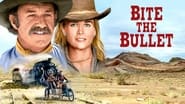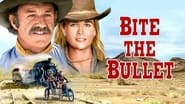Claudio Carvalho
When a newspaper sponsors 700-mile endurance horse race, a group of adventurers is attracted by the grand prize of US$ 2,000.00 for the winner.Among the participants are the former Rough Rider Sam Clayton (Gene Hackman), who fought in the Spanish-American War, and protects the animals from cruelty; his friend Luke Matthews (James Coburn), who has also fought in the war, and now is a gambler; the ex-prostitute Miss Jones (Candice Bergen) that has a hidden agenda to run the race; a Mexican (Mario Arteaga), who has toothache, and needs the money to help his poor family; the young bully Carboa (Jan-Michael Vincent) that does not respect anybody; the anonymous Mister (Ben Johnson) that wants to be famous; the Englishman Sir Harry Norfolk (Ian Bannen) that has traveled a long distance expecting to win the race.Along the days of competition, greed and betrayal affect the contestants' performances. But in the end, the survivors learn lessons of friendship and teamwork."Bite the Bullet" is an unusual western with a good adventure and interesting characters. Candice Bergen is in the top of her beauty but her character disappoints in the end, double-crossing and causing the death of the participants. Unfortunately the lame conclusion is too dramatic and unreasonable, since in accordance with the competition's rules, each horse plus horseman and gear should not weight more than a certain wight. When Sam and Luke unsaddle their horses and lead them to the finish line, it is not clear whether they have broken any of the foregoing rules and did not win the race. My vote is seven.Title (Brazil): "O Risco de uma Decisão" ("The Risk of a Decision")
zardoz-13
"Blackboard Jungle" director Richard Brooks made three westerns during his prestigious, forty-three year career in Hollywood. This rugged, liberal-minded, turn-of-the-century oater about an arduous 700 mile horse race through scenic but inhospitable terrain was his final sagebrusher. Brooks derived his screenplay from an actual historic event, the 1908 cross-country horse race from Evanston, Wyoming to Denver, Colorado, that the Denver Post sponsored with a $2,500 purse. Brooks does a fine job of assembling his sturdy, all-star, ensemble cast, with Gene Hackman and James Coburn playing leathery tough old pals who fought together under Teddy Roosevelt in Cuba. "You start trouble," Coburn quips after their first fistfight with several rowdy cowboys, "and I start bleeding." Essentially, this is a horse-friendly, competitive, sports western. The atmospheric, color cinematography is majestic, and some of lenser Harry Stradling's photography is imaginative, especially the way he integrates regular speed shots with slow motion as one horse gallops at regular speed alongside another in slow-motion. The first three-quarters of the narrative concern the race itself and the participants. The vintage steam engine train constantly chugs in and out of the story. Afterward, the action alternates between the horse race and the checkpoints where the riders pause to convey relevant exposition about themselves. The last twenty minutes focuses a prison break. Had Brooks not foreshadowed this part of the narrative, it would have looked like a last minute departure from the main plot. Alex North's flavorful orchestral score received an Oscar nomination as did the collective efforts of Arthur Piantadosi, Les Fresholtz, Richard Tyler, Al Overton Jr., in creating the sound. Brooks dwells on the theme of cruelty to animals and his spokesman who advocates the humane treatment of horses is the Gene Hackman protagonist. Brooks introduces him as he rescues a colt from coyotes. The colt is chained to a broken down the Tip-Top Glue Factory wagon. Brooks also takes a swipe at racial intolerance in the form of the prejudice shown toward a Mexican vaquero who is ridiculed by some secondary characters. Our hero Sam Clayton is quick to come to come to the vaquero's defense with a story about his Hispanic grandfather that he bathed everyday and on whom he never found a greasy spot.The race has two rules. First, no horse can carry more than 160 pounds, including rider, saddle, and extras. Second, the race coordinators have provided each horseman with a compass and a map with the safest route. They don't have to follow the safest route, but they must make it to each checkpoint or they will be disqualified. Mario Arteaga elicits sympathy as a Mexican horseman with a toothache. During a barroom scene, the woman serving the liquor gives the Mexican a new-fangled concoction designed to kill pain: heroin. Technically, just as Sergio Leone broke new ground in "For A Few Dollars More" with a marihuana puffing bandit, Brooks breaks ground with the use of heroin.Candice Bergen furnishes the female interest as Kate Jones, a hard-luck prostitute after the $2-thousand prize money. Kate has more at stake as we later learn when Brooks takes a break during the last twenty minutes from depicting horses galloping through deserts, wading streams, and tangling with bears. The heroine wants to break her no-good, bank robbing husband Steve (Walter Scott, Jr., of "Cotton Comes to Harlem") out of prison. After she does, she realizes what a terrible mistake that she has made. Brooks ties this to the theme of bad marriages, and our mustached protagonist Sam Clayton (Gene Hackman of "Bonnie and Clyde") sums up the problem in one phrase: "The people some people marry." Veteran western character actor Ben Johnson turns in another meaningful performance as a supporting character suffering a bad heart condition that eventually claims his life. During his dying moments, he delivers an eloquent as well as insightful soliloquy about the essence of winning. Not only does Brooks have a Mexican character, but he also has a cultivated Englishman, Sir Harry Norfolk (Ian Bannen of "Too Late, The Hero") who has crossed the Atlantic to compete in the race. Incredibly enough, Jan-Michael Vincent has the plum role as Carbo, an obnoxious, immature adult who likes to display his prowess with fists and six-guns. Actually, Carbo turns out to be no cowboy after all, and the revelation that everything that he has done to perpetuate this masquerade that he is a cowboy lends more depth and substance to his character than even the standard-issue heroes that Hackman and Coburn portray. Kate informs Carbo late in the last half-hour that she never believed that he was a cowboy. She explains that a cowboy undresses from the boots up and only removes his headgear after he has stripped off everything. Unable to resist a joke, Brooks shows Hackman and Coburn's characters eavesdropping on her speech and noticing that they still have their hats on after they have shed virtually every stitch of apparel.Naturally, the dialogue is as quotable as it is philosophical as Brooks ponders the meaning of being an American. Everything boils down to winning and the recognition that comes with winning. The Hackman hero worries that he is un-American because he has no interest about who won a champion boxing match. Brooks cannot resist debunking the Old West and the Hackman hero becomes his mouthpiece. Former Roosevelt rough rider Sam Clayton reminiscences in one scene with Kate about the lies told about the San Juan Hill charge. Later, the Dabney Coleman character complains that most of what is said about the west is a lie. Nevertheless, this memorable dialogue doesn't surpass Brooks' second western, the elegiac oater "The Professionals." "The Professionals" ranks as a far better film, more robust and exciting. Indeed, aside from Michael-Vincent's character that changes near the end of the action, the only surprise in "Bite the Bullet" is the ending.
Jonathon Dabell
By the 1970s, the western genre was virtually exhausted and many of the westerns made around that time were either cheaply-made, badly-dubbed European offerings, or depressingly violent revenge westerns (e.g The Hunting Party, The Revengers, The Deadly Trackers, The Last Hard Men, etc.) Bite The Bullet, however, is a happy exception. Not only does it resist the '70s urge to show gore and brutality, it also manages to come up with a plot that is actually quite novel. It also marks an example of the "third-time-lucky" adage for Gene Hackman.... for this was his third western of the '70s, and the first of real quality (his previous two - The Hunting Party and Zandy's Bride - being pretty terrible if truth be known).At the turn-of-the-century, various riders gather in a Wild West town to compete in an endurance horse race of some 700 miles or so. Among those seeking the glory and the romance are English gentleman Norfolk (Ian Bannen); young show-offy hot-head Carbo (Jan-Michael Vincent); a rugged old man in search of a final moment of honour (Ben Johnson); a poor Mexican with serious dental problems (Mario Ateaga); feisty female entrant Jones (Candice Bergen); former Rough Rider Luke Matthews (James Coburn); and introspective horse-lover Sam Clayton (Gene Hackman). As they ride through forests, deserts and mountains toward the finishing line, the riders get involved in various adventures and tragedies. Some lose their horses along the trail; others are even less fortunate and lose their lives.Bite The Bullet is a very good western, with convincing performances from its all-star cast and luscious cinematography from the great Harry Stradling Jr. The opening quarter of the film is fairly slow, with time given over to the character introductions and a little probing into the motivations of each rider. However, this proves worthwhile later as the fate of each rider gains significant power because the audience has come to understand - to know, if you like - the various characters. On the whole, the period detail and the dialogue seem impeccable. Alex North's score is good, and adds an extra dimension to the proceedings. The only flaw worth mentioning is that the film's structure - perhaps inevitably - is rather episodic.... every few minutes, the narrative jumps to another rider and follows their adventures for a scene or two before jumping again to another character. There was probably no way to avoid this, but it is occasionally tedious and frustrating for the viewer (because just as they are "getting into" the plight of one rider the action cuts away to the plight of another). Aside from this minor flaw, Bite The Bullet is a highly impressive film and easily earns a spot on the top-ten-westerns-of-the-'70s list.
freepony777
Bite the Bullet includes poignant performances by a charismatic Gene Hackman, a totally hot Candice Brgman, a cavalier James Coburn and a young, angry Jan Michael Vincent. This is my favorite movie! The cinematography is intoxicating. A collexion of amazing horses of every color and conformation galloping, racing, leaping across the rugged California desert for hours! A portrait of human greed pitted against animal rights and compassion. The heroes in this movie are dark and the villains are sad. The backdrop for the unfolding drama is a 700 mile endurance horse race, but within this is framework is explored war, desperation, prostitution, rape, death, heroin overdose, greed, betrayal, trains, selflessness, heroism, friendship, the human/animal bond and good 'ol triumph of the spirit. But most of all pretty, pretty horses.





